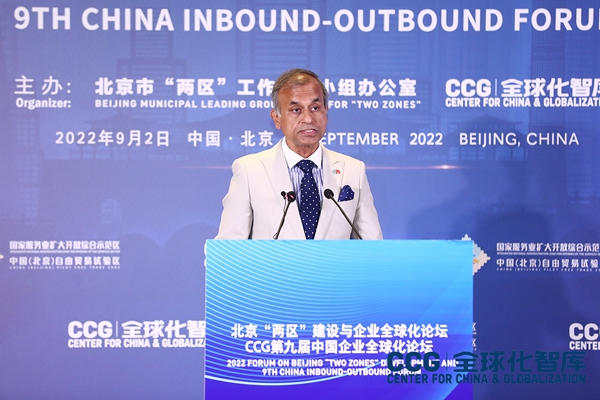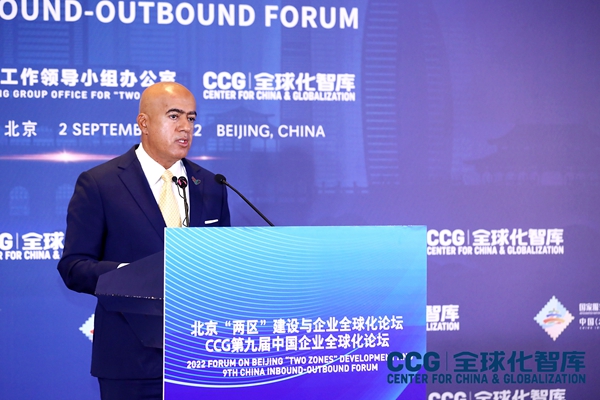Digital trade opportunities offer benefits for all
- By Zhang Liying
 0 Comment(s)
0 Comment(s) Print
Print E-mail China.org.cn, September 7, 2022
E-mail China.org.cn, September 7, 2022
With digital trade having emerged as a new growth driver, speakers at the 2022 China International Fair for Trade in Services (CIFTIS) shared their insights into how to tap the opportunities from this dynamic sector and help benefit all people.
Li Fei, assistant minister of commerce, said that digital trade, as an important component of the digital economy, helps countries connect the information nodes across trade chains, reduce information asymmetries and cut transaction costs.

Li made the remarks at the China-Shanghai Cooperation Organization Digital Trade Roundtable Seminar on Sept. 2 during CIFTIS.
Digital trade also helps countries adapt to and grasp the trend of digitalization, accelerate post-pandemic recovery, enhance economic resilience and achieve sustainable development, he said.
A report titled Digital Trade: Development and Cooperation, which was released at this year's CIFTIS, shows that global cross-border trade in digital services exceeded $3.8 trillion in 2021, accounting for 63.6% of the total trade in services.
Li suggested strengthening exchanges and coordination among government departments, the private sector, civil organizations, as well as technical and academic groups to promote the inclusive development of digital trade and provide benefits to all.
Extensive cooperation needs to be conducted in technology, industry and policy to boost connectivity and collaborative innovation through joint training and construction projects, Li added.
Siddharth Chatterjee, U.N. resident coordinator in China, said that all countries have been affected equally by changes in the digital sector, which will have a major impact on the implementation of the 2030 Agenda for Sustainable Development, bringing both great opportunities and serious challenges.

"The widening digital divide could threaten developing countries, especially the least developed countries, leaving them further behind. It is vital that we promote digital inclusion, work to bridge the digital divide and ensure that digitalization creates global opportunities while mitigating potential negative consequences," Chatterjee said at the 2022 Forum on Beijing "Two Zones" Development and 9th China Inbound-Outbound Forum also held on Sept. 2 during CIFTIS.
Urgent action is needed to ensure that emerging technologies become global public goods with equal access for all regions and all segments of society, he said.
This must be done with the goal of building an effective global digital cooperation architecture, in areas such as artificial intelligence, to better support the achievement of the economic, social and environmental goals of the 2030 Agenda, Chatterjee explained.
"As the world's second largest economy, China is a world leader in many areas of digital technology and the United Nations Office in China is eager to play a bridge role and use China's experience and advances in digital technology to benefit other developing countries," he said.
The scale of China's digital economy expanded from 11 trillion yuan (about $1.6 trillion) to 45.5 trillion yuan from 2012 to 2021, with its proportion of gross domestic product growing from 21.6% to 39.8%.
The country's digital trade is developing rapidly, with its total imports and exports of digital services growing 22.3% year-on-year in 2021 to reach $359.69 billion.
Ali Obaid Al Dhaheri, ambassador of the United Arab Emirates (UAE) to China, also expressed willingness to cooperate with China in the digital economy. He said that the UAE and China have a comprehensive strategic partnership and are committed to building a more prosperous and united world, partially through digital solutions.

According to the ambassador, the UAE has outlined several goals in terms of trade in goods and services. The first among these is to increase trade with China, especially trade in services, over the next 10 years.
"In terms of technological innovation, we have a great deal of mutual respect for the cooperation between the two countries in trade and technology, especially in the digital economy," he said.
"The world is becoming more diverse, and we need to address looming and emerging challenges on a global basis. To achieve development requires inclusiveness and we need to work with China and other key players to achieve a consensus on how to solve current cross-border challenges and to promote and generate new development opportunities," said the ambassador.






Go to Forum >>0 Comment(s)